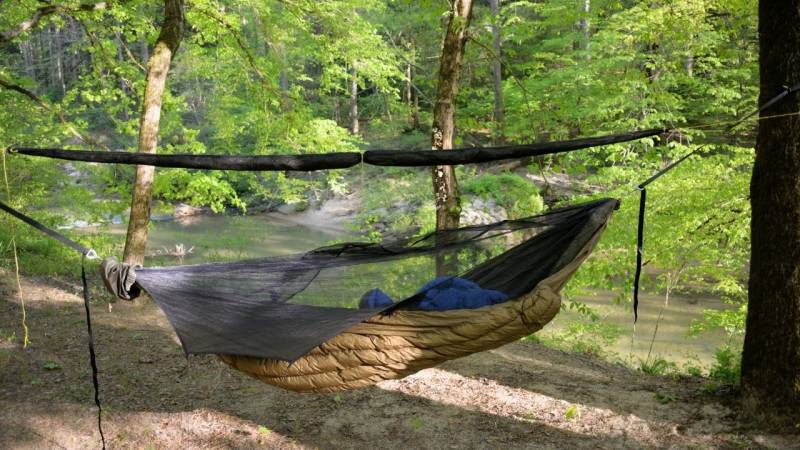
Sleeping in the hammock: Why the underquilt completes your equipment - The solution against cold nights
👉 The key facts from this guide
- An Underquilt is a type of insulation that is attached underneath the hammock to protect against cold. It is ideal for cold nights or windy environments and significantly improves sleeping comfort in the hammock.
- An Underquilt envelops you from below, like a cocoon, protecting you from cold and wind, and provides more warmth and protection than a sleeping mat.
- A Topquilt is a blanket that covers you from above and is especially useful in combination with an Underquilt on cold nights.
- An Underquilt is particularly useful at temperatures below 15 degrees Celsius when a sleeping mat reaches its limits.
- It is possible to convert an old sleeping bag into an Underquilt by preparing it to be wrapped around the hammock.
- When purchasing an Underquilt, one should consider good insulation, lightweight, portability, and full length.
Do you know the problem when you're lying in your hammock and the cold wind blows from below? It's uncomfortable, isn't it?
You're trying to bundle up, but it's not really helping. The cold still creeps in and disturbs your relaxed time.
But imagine there is a solution. The Underquilt for the hammock. It hangs under your hammock and protects you from the cold.
Never freeze again, never have uncomfortable moments once more. Just you, your hammock, and the warm comfort of the Underquilts.
You will feel the difference.
Let's dive deeper now, and you will know what an Underquilt is and whether you need one.
End the cold and discomfort: The life-changing advantage of Underquilts
On longer hikes, my tent is often too bulky and not really practical.
Instead, I like to use my hammock as a sleeping option (Find the basics of hammocks here).
But on cold nights, the cold literally creeps into my back and with a light breeze, a restful night is difficult to achieve.
An air mattress (here's my top list) is not an option for me as it tends to shift and disturb my sleep.
I usually have a sleeping bag (my top list) with me anyway, but on cold nights the situation described above often occurs.
An alternative is a so-called Underquilt, which protects the hammock from cold and wind from below.
After conducting more research and gaining experience, I am now compiling my collected knowledge here and discussing the equipment you should choose when it comes to hammocks.
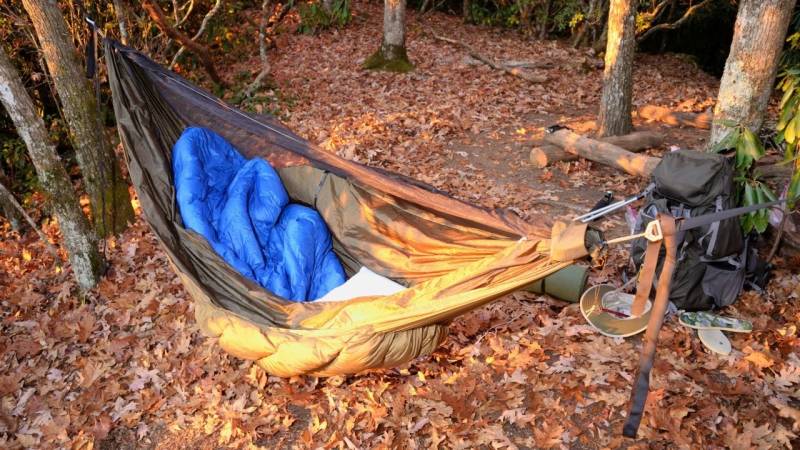
What is an Underquilt?
The Underquilt, a type of insulation, is attached underneath the hammock to protect against cold. It is ideal for cold nights or windy environments and significantly enhances sleeping comfort in the hammock.
Let's go into detail:
If you lie in your sleeping bag in the hammock, it will be compressed along with your clothes due to your weight.
Through this compression, a cold bridge is created here, and the sleeping bag offers little to no insulation anymore.
An Underquilt, on the other hand, does not lie with you in the hammock, but envelops you from below like a cocoon. Thus, you are protected from cold and wind from below.
Therefore, you should by no means leave your sleeping bag at home. Because from above you are still unprotected from the cold. However, a top quilt would be an alternative, but primarily bulkier in terms of pack size.
Therefore, the question is not whether to use an Underquilt or a sleeping bag, but rather in which situations an Underquilt is useful and what possible alternatives are.
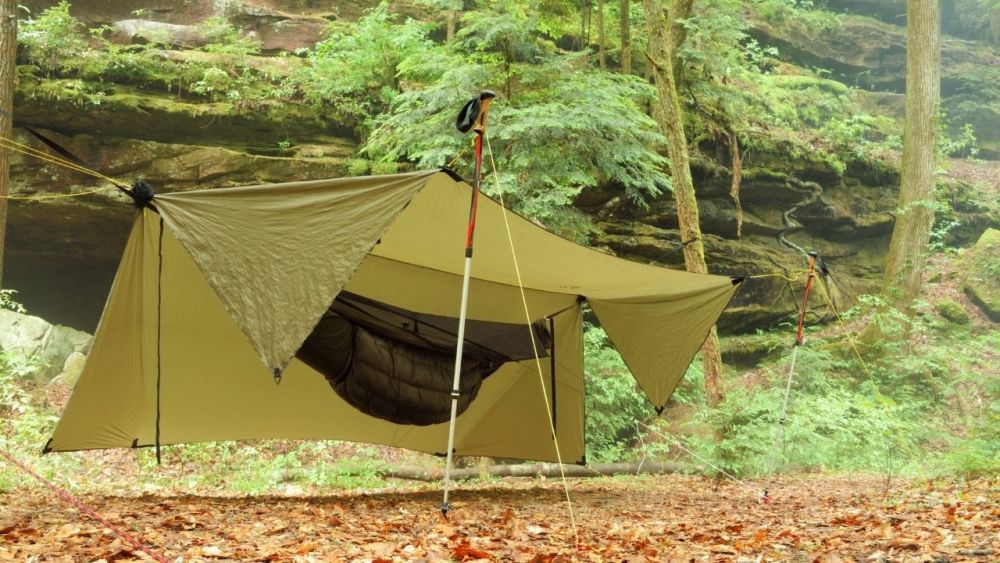
The sleeping pad as insulation
In general, I think sleeping pads are great for isolation in the hammock.
You can easily attach them to your backpack, they weigh next to nothing and keep you warm from below.
In addition, if necessary, you can quickly switch to the ground if it is not possible to hang your hammock.
The first problem, however, is convenience.
Since the sleeping pad usually lies with you in the hammock, it slips and doesn't really conform well to the shape.
That has caused me several sleepless nights, which is why I won't be using the sleeping pad again. Additionally, even with a sleeping pad, it gets too cold in the winter.
It should be noted that there are hammocks with built-in compartments for sleeping mats. I have not personally tested these, but I can imagine that they work well.
However, since I would rather not invest in a new hammock, the question remains whether an Underquilt is worth it.
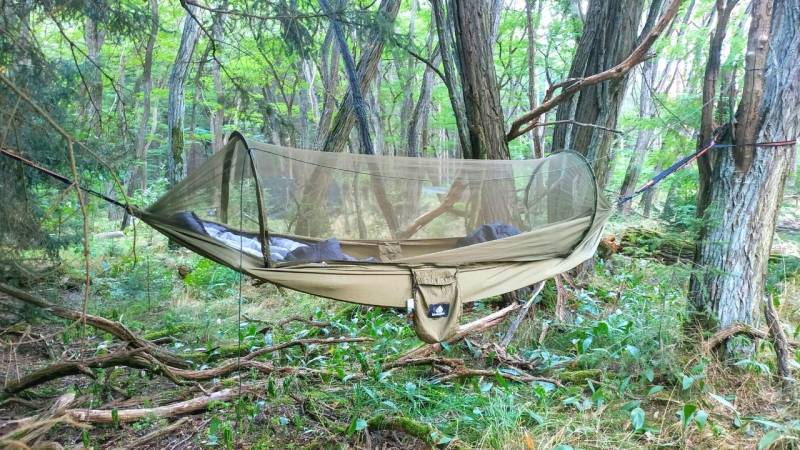
When do you need an Underquilt?
When I was hiking in France for many weeks in the summer, I only slept in my hammock.
Here my sleeping bag was almost too warm and an Underquilt would have been unnecessary. But the temperatures were mild at night and the wind was only blowing gently.
However, if you also want to sleep warm in the remaining three seasons in Germany or even further north, the Underquilt is definitely worth it.
From temperatures below 15 degrees, the sleeping pad - whether with compartment or without compartment - reaches its limits.
Here it naturally depends on the temperature sensations of your body. I tend to get hot in my sleeping bag in the summer, so an Underquilt would simply be too hot.
However, it also provides additional comfort and security. Especially during my first solo adventures, it was often a challenge to get into the hammock.
An Underquilt can certainly provide additional security here. Completely enclosed in the cocoon, you will be gently lulled into the land of dreams.

What is a top quilt?
A top quilt is essentially a blanket. Many top quilts resemble the material of a sleeping bag, but they do not envelop the entire body like a sleeping bag. It was designed for use in hammocks or for sleeping on the ground outdoors.
What makes a top quilt so special?
A top quilt in combination with an Underquilt is particularly useful on cold nights.
In winter, the combination of quilts and sleeping bags may be necessary to avoid freezing.
For autumn and spring, a sleeping bag is usually sufficient as protection from above. However, it is also important to know one's individual needs in this case.
Also read
Sleeping outside in winter - with these proven tips it will definitely work - Many outdoor enthusiasts shy away from the cold of a winter night. But with the right equipment and tips, you can handle sub-zero temperatures.
Convert sleeping bag into Underquilt
Principally, an Underquilt is nothing more than a sleeping bag that you attach to the bottom of your hammock.
Because its primary function is insulation without compression by your body weight. In theory, a sleeping bag can therefore be converted into an Underquilt.
Be aware that you have to cut your sleeping bag so that you can wrap it around your hammock.
Furthermore, you have to prepare it in such a way that you can also customize your future quilt individually from the hammock.
I particularly appreciate this feature in my Underquilt, as otherwise I would have to go out into the cold at night to make adjustments.
Everything you need for this is an old sleeping bag, sewing stuff (or alternatively tape), and if necessary, an elastic band.
Here is a short guide for a free under-quilt:
- Cut a hole at the foot end so that the hammock fits through
- Sew or glue the sides of the hole back together to protect the lining
- Optional: Sew in an elastic band to minimize the size of the hole
- Cut another hole at the head end exactly where the head would normally be. The hole should be roughly the same size.
- Usually, a sleeping bag already has an elastic band here, so you just need to sew everything back together.
- Sew straps to adjust your quilt to the hammock
You now place the quilt over your hammock. Depending on the hammock and sleeping bag, you may need to make some adjustments to ensure everything fits properly.
The instructions are without guarantee and I have simply experimented myself. Therefore, you should not sacrifice your favorite sleeping bag for it.
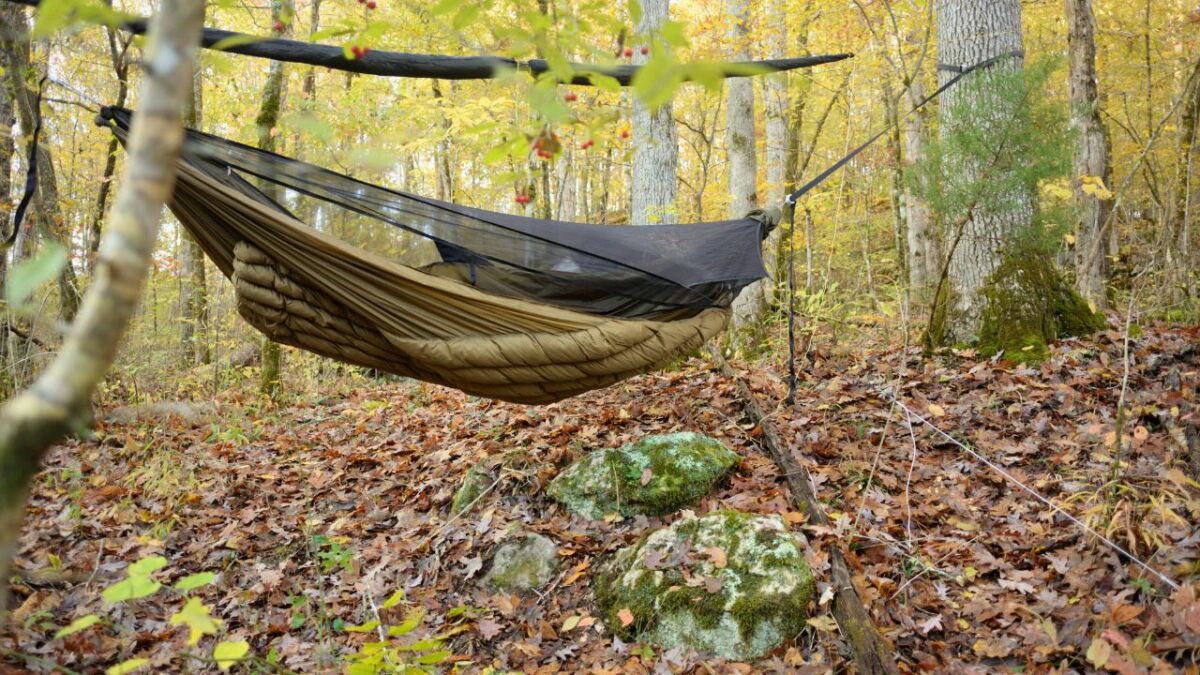
Questions and Answers
What is the difference between a top quilt and an Underquilt?
In contrast to a sleeping bag that covers you from head to toe, Underquilts hang underneath and cover the underside of your hammock, while Topquilt covers you from above, just like a blanket.
Can you use an Underquilt as a Topquilt?
An Underquilt can be used as an alternative to a sleeping bag or Topquilt when you want to sleep on a sleeping pad. Keep in mind that the sleeping pad should have a suitable R-value.
Is a sleeping bag or an Underquilt better for cold weather?
It's a matter of personal preference. Underquilts offer the greatest flexibility and have many advantages, but if you spend a lot of time in alpine or snowy conditions, a sleeping bag will provide maximum warmth. Like many hiking gear items, there is often not one perfect item for all occasions.
Do you need an Underquilt in the summer?
In general, without any real under insulation, you would start getting a cold butt after a few hours at temperatures below 15 degrees. Some summer nights get so cool that you usually require something for under insulation all year round. Your two options are: a sleeping pad or an Underquilt.
Do you require an Underquilt if you have a sleeping pad?
If you want the most comfortable option, choose an Underquilt. However, if you're looking for a more versatile and budget-friendly option, opt for at least a foam sleeping pad, if not an inflatable sleeping pad.
How to select an Underquilt?
Focus on the temperature rating to find the best Underquilt for your hammock. The average sleeper will sleep comfortably in most conditions with an Underquilt rated at approximately -7 °C. Sleepers who are more sensitive to cold should pick an Underquilt rated at approximately -12 °C or lower.
What are the differences and similarities between sleeping bags, sleeping pads, Underquilts, and Topquilt?
| Equipment item | Thermal insulation | Comfort | Flexibility | Price |
|---|---|---|---|---|
| Sleeping bag | Very good | Good | Medium | Varies greatly |
| Sleeping pad | Good | Medium | High | Varies |
| Underquilt | Very good | Very good | Medium | Varies greatly |
| Topquilt | Good | Very good | High | Varies greatly |
This table is only a general overview and the specific properties may vary depending on the model and manufacturer.
What should you consider when buying an Underquilt?
A good Underquilt for a hammock should have the following characteristics:
- Good Insulation: An Underquilt should be well insulated to retain heat and keep out the cold. The indication of "4 seasons" indicates that such models are designed for different weather conditions.
- Lightweight and Portable: If you intend to hike or backpacking with your Underquilt, it must be lightweight and easy to pack.
- Full Length: A full length Underquilt typically offers more warmth and protection than a three-quarter length or half-length Underquilts. It's especially essential when you're camping in colder conditions.
What are good Underquilts?
One of the highest rated Underquilts is the "ENO Underquilt". It is praised for its good value for money, high-quality craftsmanship, and versatility.
Another well-rated and affordable Underquilt is the "OneTigris Underquilt", known for its lightweight and excellent insulation.
Furthermore, I would like to mention the "Onewind Underquilt". It was designed to withstand temperatures from 1 to 10 degrees and is therefore suitable for 3 seasons.
The OneTigris Topquilt provides optimal warmth protection from above for your hammock. It is ideal for outdoor adventures as it is made from ultralight yet durable material.
With its special conical shape and adjustable head section, it is perfect for overnight stays in the hammock.
Furthermore, keep in mind that the "best" Underquilt heavily depends on your individual needs and preferences, including your budget, your preference for weight versus warmth, and so on.
My conclusion: Is an Underquilt useful?
If you want to sleep in your hammock in wintry temperatures, the Underquilt is a must.
Furthermore, it also provides comfort and security on warmer nights.
However, the large size is a disadvantage that should definitely be taken into account.
In addition, such a quilt can cost a lot of money. An old sleeping bag can alternatively be used as a DIY Underquilt.
If you want to delve deeper into dealing with cold in winter, I highly recommend my guide "How to sleep safely and warmly in a hammock during winter".


Author of the guide
Martin Gebhardt
Hey, I'm Martin. On my blog, you will learn the basics and numerous details about living in the wild. I think survival, bushcraft and the good life in nature are the keys to happiness. Find me here on Instagram or on YouTube. You can find more about my mission on the About Me page.
Was this guide helpful?
18 people found this guide helpful.
5.00 out of 5 points (18 Ratings)
Comments (0)
This post may contain affiliate links. So if you click on the links and make a purchase, I will receive a small commission at no additional cost to you. Click here, to learn more about it.



